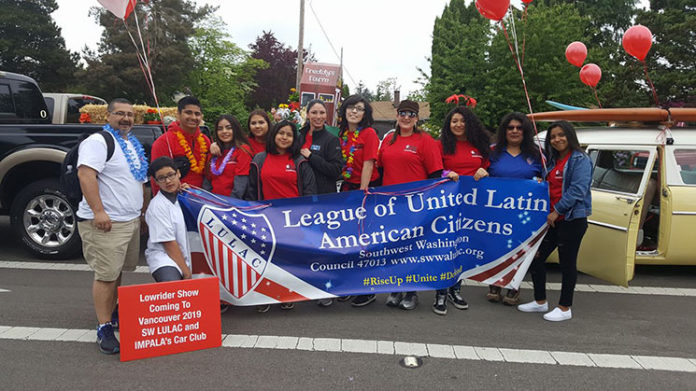The Southwest Washington League of United Latin American Citizens (LULAC) was established in August 2011, and is one of 1,000 local councils run by volunteer community leaders. The Mission of the LULAC is to advance the economic condition, educational attainment, political influence, housing, health and civil rights of the Hispanic population of the United States. Through the formation of the local council, community leaders can unite to wield the power that LULAC possesses at the national level.
LULAC provides more than half a million dollars in scholarships to Latino students each year, organizes citizenship and voter registration drives, develops low-income housing units, organizes youth leadership and mentoring programs, and endeavors to empower the Latino community at all levels – local, state and national.
LULAC has introduced the Collegiate LULAC Council, where college students can make a difference regarding issues that the Latino community faces. A Collegiate Council is comprised of college student volunteer members under the authority of the LULAC National Board of Directors. At this time, about 500 college students in the United States and Puerto Rico are taking part in this new program.
The Vancouver LULAC Council No. 47013 is headed by Chapter President Hector Hinojosa. In Vancouver, there are five LULAC standing committees: Civic Engagement; Law Enforcement Relations; Youth Leadership Programs; Immigration; Community Health; and Environmental Justice.
“The Council has made significant contributions to the local community,” said Washington State LULAC Director Diana Perez. “Foremost was building bridges and relationships in order to make broader impacts to the community and to be able to address tough challenging issues together. Three priority areas have led the successes of the Council. Health, education and immigration have been strategic items for the past seven years.”
History of LULAC
In 1836, after the Texas Revolution, the Republic of Texas seceded from Mexico, but Mexico didn’t recognize this action. Almost a decade later, the year 1845 marked the American annexation of the independent Republic. At the time, Mexico suffered considerable instability under President/General Antonio Lopez de Santa Anna, with a number of constitutional changes happening and continuing internal struggles after their independence from Spain in 1921 – the Treaty of Cordoba. The sparsely populated northern area of Mexico – with about 7,000 non-Indian settlers – was not a priority, and not well controlled by the Mexican government.
In 1845, newly elected U.S. President James K. Polk sent troops and a diplomatic mission to Mexico. After Mexican forces attacked U.S. forces, Polk requested the U.S. Congress declare war, a war that ended in 1848 with the Treaty of Guadalupe Hidalgo and the secession of the disputed lands to the United States, which ultimately served U.S. interests in western expansion and the idea of Manifest Destiny. The U.S. paid $15 million in compensation for the war’s physical damage, and assumed $3.25 million of the Mexican government’s debt to U.S. citizens.
However, over subsequent years, Mexican citizens in the U.S. suffered from discrimination and segregation, and the cessation of a number of civil rights, especially in Texas. In response to those days of prejudice against Mexican Americans emerged three main organizations: The Order of the Sons of America, the Knights of America in San Antonio and LULAC. Then in 1929, the three organizations merged into what is now LULAC.
LULAC Now
Today, LULAC is the oldest and most widely respected Hispanic civil rights organization in the U.S. It has a network of 135,000 community volunteers, 1,000 local councils, 60 community technology centers and 14 LULAC National Educational Service Centers across 35 states, the District of Columbia and Puerto Rico.
In their efforts to further education, the Southwest Washington LULAC Council has established a Collegiate LULAC Council at Washington State University Vancouver. As part of WSU Vancouver’s Collegiate LULAC Council, college students can help influence issues that affect the Latino community on and off campus.
“The Council was able to help establish the first LULAC National Education Service Center site in Southwest Washington,” Perez said. “Thanks to a U.S. Department of Education Upward Bound grant. The Council sponsors a student on an annual basis to attend the Washington Youth Leadership Seminar, hosts the Regional LULAC Youth Conference focused on conservation and the environment, and provides guidance to the local LULAC Youth Council.”
LULAC events
In May 2018, to facilitate a legal and family planning clinic, the LULAC Southwest Washington Council partnered with the YWCA Clark County, the Latino Community Resource Group and the Clark County Volunteer Lawyers Program. Volunteer attorneys went to the Clark County YWCA to offer pro bono work to Latino community members. The organizations worked together to assist with registration, intake, Spanish interpretation and childcare. The next clinic is Nov. 10.
On June 22, a LULAC Pacific Northwest Regional Youth Conference was held at Portland State University. Mike Cano was the motivational speaker. Workshops included Leadership Skills Building, Civic Engagement, and Education and Conservation.
At the end of June, Southwest Washington LULAC helped sponsor the Southwest Washington Tamale Festival at Reflection Plaza in Washougal. Categories were Best Meat, Best No Meat/Veggie and Best Sweet/Dessert. The festivities included a beer garden, music, including Son de Cuba, and children’s activities. A portion of the proceeds supported the local student scholarship fund. Other sponsors were the iQ Credit Union, Molina Healthcare, Vancouver Brewfest, Riverview Community Bank, the law office of Eulalia Soto, the City of Washougal and BNSF Railway.
This past July, at the Advancing Equity Coalition session with Center for Equity and Inclusion, a consulting agency in Portland, various organizations in Clark County, including LULAC, came together to build a coalition to benefit underrepresented communities.
If you are interested in forming a LULAC Council in your area, visit the LULAC website for instructions and contact Director Diana Perez at roseprez13@gmail.com.






